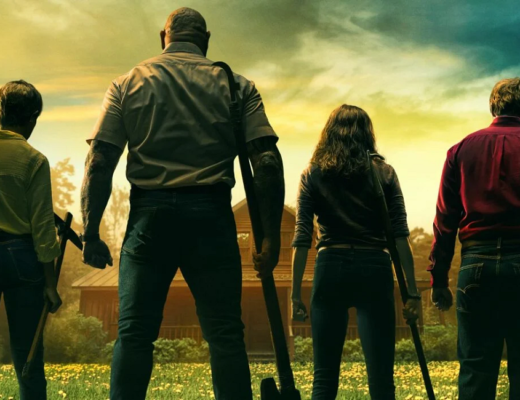Night Raiders teases a unique dystopian setup, and then fails to meaningfully develop any of its promising parts.
In a millennium overstuffed with dystopian presentations, it’s fair to wonder what value they continue to offer amidst such saturation, their aesthetic contours typically supplanting any meaningful rhetoric, rendering the majority of these works largely anonymous. Most of these efforts are served in one of a few flavors: dystopia by way of technology, environmental collapse, religious/philosophical order, or tyrannical government (with the uber-wealth class sometimes standing in for a strictly political dimension). The setup offers fertile terrain for meaningful, serious-minded critique, certainly, with the subgenre’s literary foundation evolving from its anti-collectivist and anti-authoritarian origins to realize rage against more contemporary boogeymen like monopolism, surveillance states, and big tech. But over the past decade-plus, much of the power has been bled from dystopian storytelling as young adult literature has turned it into a whole-ass brand, ushering it more firmly into the mainstream while simultaneously sanding down much of its discursive potential and artistic rigor in favor of chosen one hero narratives. This regression, of course, began in the publishing world, but cinema quickly followed suit, with formally distinct and intellectually legible 2000s works like Children of Men, Southland Tales, and Time of the Wolf giving way to a dystopia superabundance, first in the form of tween-facing franchise adaptations — The Hunger Games, Divergent, The Maze Runner — but increasingly, over the past decade, in the realm of low-budget and auteur cinema.
The most basic test, then, with any such new enterprise, is whether there is substance beneath the homogenized sheen of dystopian world-building and production design. The latest film to subject itself to this litmus test is Danis Goulet’s Night Raiders, and on paper, there’s plenty more potential on tap than in your average cacotopian setup. Set in the 2040s, following a society-shattering war across all of North America, the film follows Niska (Elle-Máijá Tailfeathers), a Cree mother desperately trying to keep her daughter Waseese (Brooklyn Letexier-Hart) from the clutches of the forced-education camps where children are now required to go. Echoes of 1984’s re-education campaign are immediately obvious, but more distinctive and thematically rich are the parallels to Canada’s nightmarish residential school system, establishing Night Raiders with a unique angle with which to go about its speculative musings, and entering into a dialogue with the past in the way all such dystopian fiction must. When Niska and Waseese end up separated, the former is willing to do whatever it takes to reunite, leading her to join up with a group of Cree resistance fighters to take on these new new-world colonizers.
So far, so good, and the film’s immediate visual character keeps optimism high. Design choices make the most of Night Raiders’ relatively limited budget, presenting a clever retro-futurist mashup: digital billboarding is spied on top of dilapidated brick facades, crumbling buildings and dust-covered towns (presumably collateral of the junta-won war) contrast with the military’s pristine outfitting, and the whole thing is shot in washed-out, fatalistic grays in the vein of the aforementioned Children of Men. But as early establishing exposition gives way to alternately perfunctory and contrived plot beats — some hemming and hawing about joining up with the rebels, a little toothless drama between periphery characters used only to while away time until the coming climax — it becomes clear that neither this particular fictional world nor any real-world implication is much fleshed out. The smaller scale is certainly welcome in the wake of CGI orgies like Ready Player One, attention instead paid to bringing its ominousness to crescendo, but Night Raiders also can’t help but feel narcotized at times, its energy flagging during a prolonged middle stretch and a dearth of kineticism only compounding this languor.
Things only get worse when Goulet’s film finally reaches its climax, which most literally realizes its past-meets-future ponderings as the group of Indigenous rebels face off with a military unit equipped with their own drone army. But while the tilt toward personal and cultural catharsis registers, it’s undermined by an influx of gibberish sci-fi crud, as loosely-conceived as everything else here. There’s no denying a certain appealing texture to Goulet’s film, lightly reminiscent of the bleak First Nation future imagined in Louise Erdrich’s Future Home of the Living God, but there’s simply no necessary specificity to be found, only vague insinuation: the implied assimilation efforts are left unexplored (there’s the token scene of kids assembling a rifle, and not much more), a rampant virus is left as murkily understood as the inciting war that led to this new world, and any cultural particularity is left unattended to, Goulet instead content to foreground Indigeneity while leaving all meaningful interrogation dangling. Points for approaching the dystopia film from an angle other than covert government conspiracy, but in suggesting something more thoughtful without delivering any follow-through, Night Raiders only avoids anonymity by being both so notably shallow and dull.







